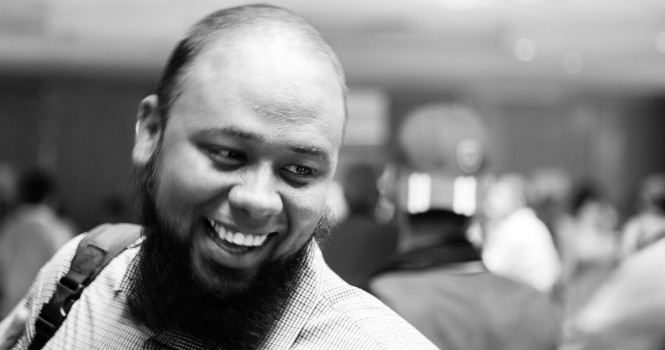This week marks two years since Egyptian human rights lawyer Mohamed El-Baqer was arrested. Last month on his 41st birthday, TIMEP joined 15 other organizations to call for his release of Egyptian human rights lawyer Mohamed El-Baqer from detention, El-Baqer has yet to be referred to trial date, and has been subject to mistreatment and extended pretrial detention. He is currently being held in Tora Maximum Security Prison. His detention was most recently extended for 45 days on September 13.
Who is Mohamed El-Baqer?
Mohamed El-Baqer is the founder and director of the Adalah Center for Rights and Freedoms, an organization founded by students and lawyers in 2014, initially in response to the security crackdown on student organizing at the time. Leading up to and during his work with Adalah, El-Baqer had a long history of active engagement in defending religious and ethnic minorities, along with providing legal aid to protesters and civilians being tried in military courts.
Since then, Adalah has continued to provide pro bono legal aid to detainees. In addition to their legal counsel, the Adalah Center has been an outspoken critic of rights abuses, partnering with other Egyptian organizations against the violation of minority rights, civil society, and due process.
The founding and operations of the Adalah Center has come at a time when it has become increasingly dangerous to provide legal aid to detainees and assist in confronting the abuses that they face.
Timeline of El-Baqer’s detention
The two years of El-Baqer’s detention have been circuitous and emblematic of the way in which detainees’ detentions are repeatedly renewed in mounting cases, which allows for the effective circumvention of pretrial detention limits set forth in the law.
September 29, 2019-Mohamed El-Baqer is detained during an investigation session while defending activist Alaa Abdel Fattah, who had been arrested earlier that day from his probation cell in Dokki Police Station. At the time of his arrest, El-Baqer was told that he faced charges of “joining a terrorist group,” “funding a terrorist group,” “disseminating false news undermining national security,” and “us[ing] social media to commit a publishing offense.” He was transferred to Tora Prison the following day.
October 9, 2019-During his detention renewal hearing, El-Baqer testifies that when he was taken to prison, he was blindfolded and abused, left in unsanitary conditions, and was denied access to the prison canteen for the first nine days of his detention.
August 30, 2020– El-Baqer is brought before Supreme State Security Prosecution (SSSP) and questioned in a second, separate case, facing new charges of “joining a terrorist organization” and “taking part in a criminal agreement to commit a terrorist crime.” The new charges cited case files that his lawyers were unable to examine.
February 18, 2020-The Cairo Criminal Court orders release of El-Baqer, along with Abdel-Fattah and activist Hamed Siddiq.
February 20, 2020-The court accepts the appeal submitted by the SSSP against the release order, ordering him back into pretrial detention.
November 23, 2020-Egypt’s Official Gazette announces that El-Baqer, along with nearly 30 other activists, have been added to the “terror watch list” for 5 years in connection with Case 1781/2019—a case in which El-Baqer had never been questioned and in which his exact charges have never been disclosed. The decision involves a travel ban, prohibition on political or civic work for give years, and the likelihood that he will be disbarred by the Egyptian Bar Association. This is the third case brought against El-Baqer since his arrest. The decision is being appealed, and the first review session is scheduled for November 28, 2021.
Implications of arrest and detention
El-Baqer’s detention has been emblematic of the way in which experts and activists in various fields have been targeted Egypt, both broadly and as it relates to legal professionals specifically.
“Authorities have increasingly employed repressive tactics such as prolonged pretrial detention, enforced disappearance, torture, and judicial harassment to silence all critical voices, including through unfounded investigations for national security and counter-terrorism related charges,” says the Observatory for the Protection of Human Rights Defenders.
In addition to the ill treatment El-Baqer is alleged to have undergone in detention—something highlighted by both international and domestic civil society organizations—he also faces a barrage of charges from a steady trickle of cases, as is often done with detainees. Such practices allow authorities to circumvent protections against extended pretrial detention, which cannot extend more than 18-24 months for felonies.
The bringing of new cases against El-Baqer, a practice called “rotation,” means that he can remain in detention for them, even after the pretrial detention limits for earlier cases have expired. The terrorism-related charges brought against him also speak to a broader exploitation of such laws against activists and lawyers.
Both of these practices—”rotation and terrorism-related charges—were highlighted in a joint statement by 31 countries at the United Nations Human Rights Council this past March, which expressed deep concern “about the application of terrorism legislation against human rights activists, LGBTI persons, journalists, politicians and lawyers,” calling on Egypt to “cease the use of the terrorism entities list to punish individuals for exercising their right to freedom of expression.”
El-Baqer represents one of many lawyers—an estimated more than 80 total—detained in Egypt for their work. Labor rights lawyer Haitham Mohamadein and human rights lawyer and former MP Zyad Eleimy both remain in detention, while Mahinhour ElMassry—who was detained while carrying out her professional duties like El-Baqer—was recently released after being held for more than 20 months.
These lawyers often serve as the “last line of defense” against the ongoing crackdown on fundamental freedoms. El-Baqer himself was providing legal aid to Abdel Fattah, who was facing accusations of “inciting protests.”
In addition to a long list of domestic and international civil society organizations, calls for El-Baqer’s release have come from members of U.S. Congress, European Parliament, and the UN Human Rights Office.
